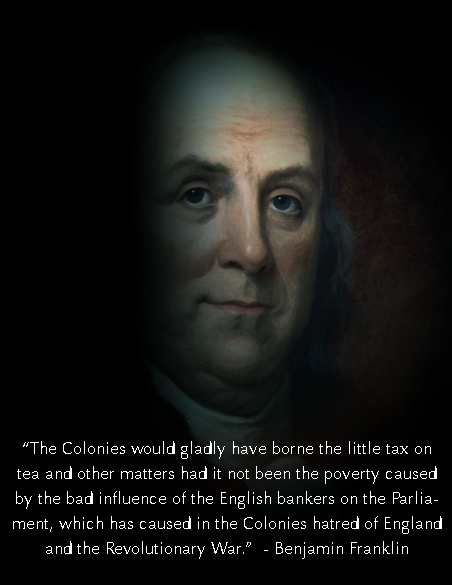|
The Spirit of Christ
Reigns Supreme ~ Forwarding
Natural Earth
Infinity 999
∞ |
"Let us therefore animate and encourage each other, and show the whole world that a Freeman, contending for liberty on his own ground, is superior to any slavish mercenary on earth" – George Washington, 2 July 1776
Actively Move the Earth to Natural Earth
Infinity 999 ∞
~The Holistic 360o
Success of
Colonial Script~
|
|
|
Colonies More Prosperous Than The Home Country
Before the American War for Independence in 1776, the colonized part of what is today the United States of America was a possession of England. It was called New England, and was made up of 13 colonies, which became the first 13 states of the great Republic. Around 1750, this New England was very prosperous. Benjamin Franklin was able to write:
"There was abundance in the Colonies, and peace was reigning on every border. It was difficult, and even impossible, to find a happier and more prosperous nation on all the surface of the globe. Comfort was prevailing in every home. The people, in general, kept the highest moral standards, and education was widely spread."
When Benjamin Franklin went over to England to represent the interests of the Colonies, he saw a completely different situation: the working population of this country was gnawed by hunger and poverty. "The streets are covered with beggars and tramps," he wrote. He asked his English friends how England, with all its wealth, could have so much poverty among its working classes.
His friends replied that England was a prey to a terrible condition: it had too many workers! The rich said they were already overburdened with taxes, and could not pay more to relieve the needs and poverty of this mass of workers. Several rich Englishmen of that time actually believed, along with Malthus, that wars and plague were necessary to rid the country from man-power surpluses.
Franklin's friends then asked him how the American Colonies managed to collect enough money to support their poor houses, and how they could overcome this plague of pauperism. Franklin replied:
"We have no poor houses in the Colonies; and if we had some, there would be nobody to put in them, since there is, in the Colonies, not a single unemployed person, neither beggars nor tramps."
Thanks To Free Money Issued By The Nation
His friends could not believe their ears, and even less understand this fact, since when the English poor houses and jails became too cluttered, England shipped these poor wretches and down-and- outs, like cattle, and discharged, on the quays of the Colonies, those who had survived the poverty, dirtiness and privations of the journey. At that time, England was throwing into jail those who could not pay their debts. They therefore asked Franklin how he could explain the remarkable prosperity of the New England Colonies. Franklin replied:
"That is simple. In the Colonies, we issue our own paper money. It is called 'Colonial Scrip.' We issue it in proper proportion to make the goods pass easily from the producers to the consumers. In this manner, creating ourselves our own paper money, we control its purchasing power and we have no interest to pay to no one."
| © 2025 WhenTheyAreGone.US |




